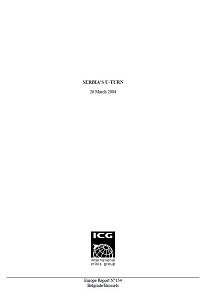SERBIA'S U-TURN (ICG Balkans Report № N°154)
SERBIA'S U-TURN (ICG Balkans Report № N°154)
Author(s): Author Not Specified
Subject(s): Civil Society, Governance, Government/Political systems, Peace and Conflict Studies
Published by: ICG International Crisis Group
Summary/Abstract: In politics and policies, Serbia increasingly resembles the Milosevic-era without Milosevic. Its reaction to the catastrophic mid-March 2004 near collapse of the UN mission in Kosovo (UNMIK), the strong showing by ultra-nationalists in the 28 December 2003 parliamentary elections and the subsequent two-months of squabbling before democratic parties could form a minority government that depends for survival on the support of Milosevic's old party all are signs that more trouble lies ahead. In 2004 Serbia can anticipate continued political instability, increasingly strained relations with the West and further economic decline. The spasm of ethnic cleansing of Serbs by Albanians in Kosovo has raised the prospect of Kosovo partition, strengthened the nationalist right wing and increased anti-Western sentiment. Instability and economic weakness could hasten moves by Montenegro towards independence, while Kosovo tensions could spill over into the Presevo valley, Sandzak and even Vojvodina.
Series: ICG Balkans Report
- Page Count: 22
- Publication Year: 2004
- Language: English
- Content File-PDF
- Introduction

